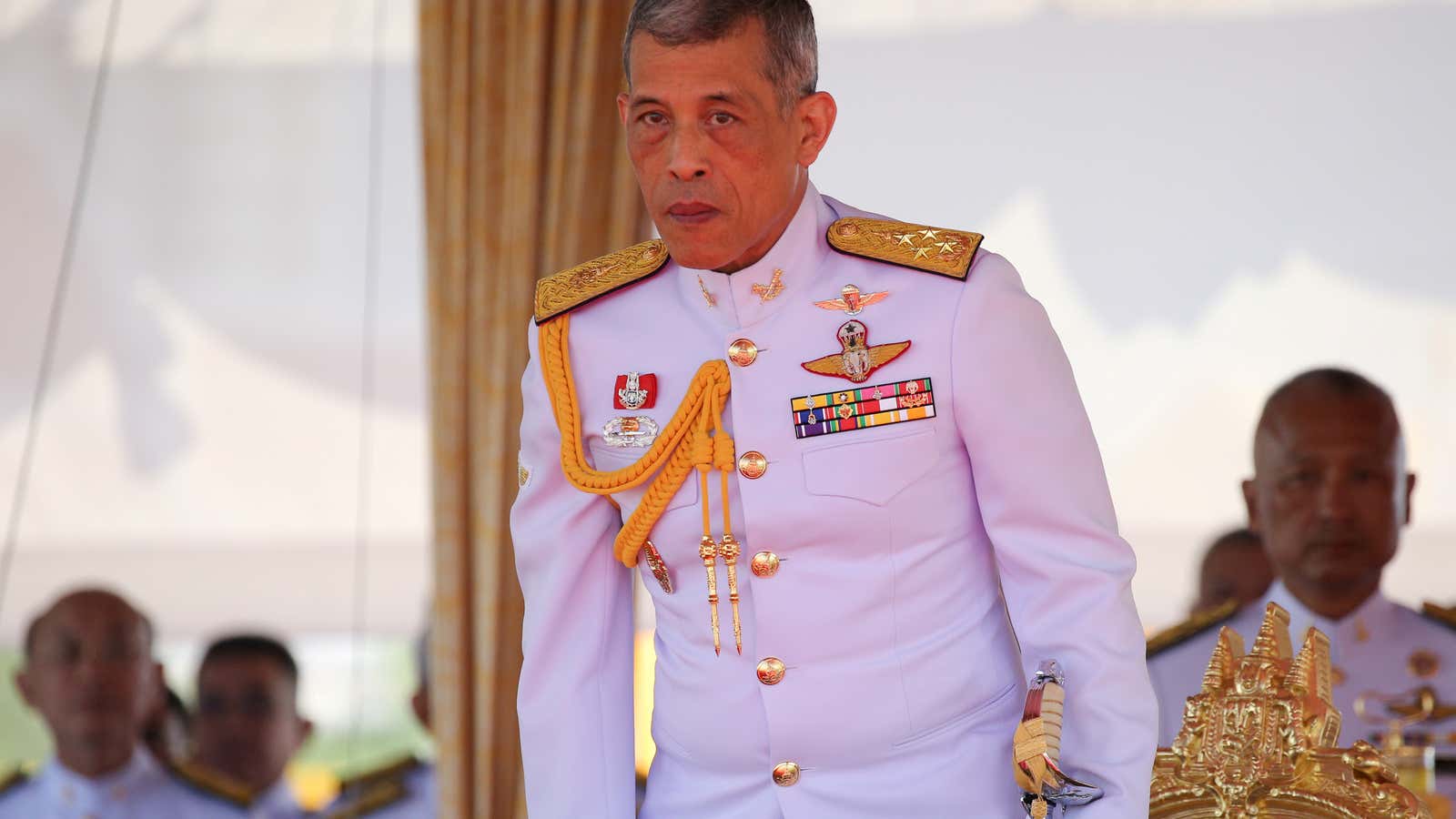Almost exactly 69 years to the day since his deeply revered father officially ascended the Thai throne in 1950, king Maha Vajiralongkorn will be coronated in an elaborate three-day ceremony starting on Saturday (May 4) in Bangkok.
The 66-year-old Vajiralongkorn will formally take the helm of a constitutional monarchy that has gradually amassed more and more power in the two-and-a-half years since the death of his father Bhumibol Adulyadej.
Also known by his title king Rama X, the current monarch cuts an unorthodox figure. He has been divorced three times, has seven children—some of whom he has disowned—and has jailed the parents and relatives of former Thai princess Srirasmi Suwadee, his third wife whom he divorced in 2014. He also gave his pet poodle Foo Foo the rank of Air Chief Marshal, and once brought the dog, dressed in formal evening attire and paw mitts, to a gala at the residence of the US ambassador to Thailand, where it jumped onto tables and lapped from guests’ glasses (paywall). And he has been seen strolling in a Munich shopping mall in a yellow crop top that exposed his fake tattoos, with a woman by his side.
In short, the king has “a bad reputation,” said Pavin Chachavalpongpun, an associate professor at the Center for Southeast Asian Studies at Kyoto University. Strict lèse-majesté laws mean that Thais have to be careful about what they say in public about the king. “But in Thailand, come on, people talk about it [in private],” he said.
And in a surprise announcement just days before Vajiralongkorn’s official crowning, the king revealed that he had married the deputy head of his personal guard force, general Suthida Vajiralongkorn Na Aydhaya, and declared her queen.
It all makes for an interesting backdrop as the king prepares to formally take the throne. And the coronation comes as Thailand’s turbulent politics show no signs of calming down.
In the run-up to elections in March—the first nationwide polls since the 2014 coup that overthrew the elected civilian government of Yingluck Shinawatra—Vajiralongkorn’s sister, princess Ubolratana Mahidol, made an unprecedented bid for prime minister as a candidate for the Thai Raksa Chart party, which is allied with former prime minister Thaksin Shinawatra. The king quickly denounced her decision as “inappropriate,” in effect barring her candidacy. Soon after, the Thai Raksa Chart party was dissolved by the country’s constitutional court and deemed “hostile to the monarchy institution.”
Some observers saw the king’s actions as a dangerous interference in the nation’s politics. Others, like Titipol Phakdeewanich, a political scientist at Ubon Ratchathani University in Thailand, saw it as an effort by the king “to ensure that the monarchy is not part of the political system.”
That official results have yet to be released more than a month since the elections has further added to the confusion.
In the meantime, a prominent opposition politician, Thanathorn Jungroongruangkit, whose Future Forward party came third in the recent election, has been accused by the election commission of breaching the election law. If convicted, he would be banned from running for elections for one year.
While the monarchy, and its close relationship with the military, has long held the cards to Thailand’s stability, Kyoto University’s Pavin sees a major weakness in the new king. “Instead of using moral authority, which he hasn’t got, he uses fear as a kind of instrument to control the public,” he said.
The extravagant coronation ceremony, he added, while largely symbolic, will serve an important goal for Vajiralongkorn “to remind Thais that the royal institution has always been with you, and will continue to be with you, whether you like it or not.”
